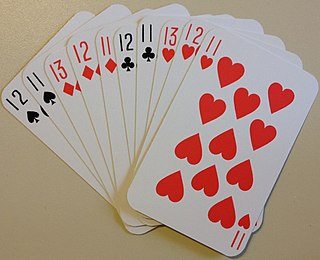
500 or Five Hundred is a trick-taking game developed in the United States from Euchre. Euchre was extended to a 10 card game with bidding and a Misère contract similar to Russian Preference, producing a cutthroat three-player game like Preference and a four-player game played in partnerships like Whist which is the most popular modern form, although with special packs it can be played by up to six players.
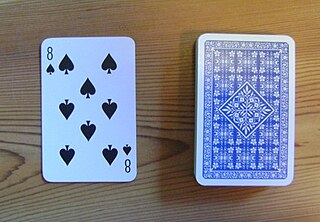
Mao is a card game of the shedding family. The aim is to get rid of all of the cards in hand without breaking certain unspoken rules which tend to vary by venue. The game is from a subset of the Stops family and is similar in structure to the card game Uno or Crazy Eights.

Texas hold 'em is one of the most popular variants of the card game of poker. Two cards, known as hole cards, are dealt face down to each player, and then five community cards are dealt face up in three stages. The stages consist of a series of three cards, later an additional single card, and a final card. Each player seeks the best five-card poker hand from any combination of the seven cards: the five community cards and their two hole cards. Players have betting options to check, call, raise, or fold. Rounds of betting take place before the flop is dealt and after each subsequent deal. The player who has the best hand and has not folded by the end of all betting rounds wins all of the money bet for the hand, known as the pot. In certain situations, a "split pot" or "tie" can occur when two players have hands of equivalent value. This is also called "chop the pot". Texas hold 'em is also the H game featured in HORSE and HOSE.
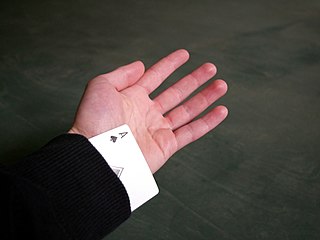
Cheating in poker is any behavior outside the rules of poker that is intended to give an unfair advantage to one or more players.
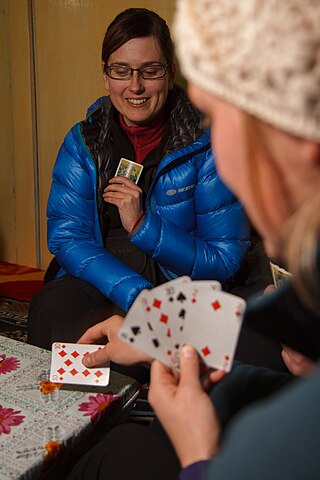
President is a shedding card game for three or more, in which the players race to get rid of all of the cards in their hands in order to become "president" in the following round. It is a Westernized version of Chinese climbing card games such as Zheng Shangyou, Tien Len in Vietnam and the Japanese Daifugō.
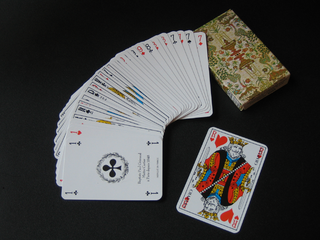
Piquet is an early 16th-century plain-trick card game for two players that became France's national game. David Parlett calls it a "classic game of relatively great antiquity... still one of the most skill-rewarding card games for two" but one which is now only played by "aficionados and connoisseurs." Historically also known as Sant or Saunt from the French Cent.

Faro, Pharaoh, Pharao, or Farobank is a late 17th-century French gambling game using cards. It is descended from Basset, and belongs to the Lansquenet and Monte Bank family of games due to the use of a banker and several players. Winning or losing occurs when cards turned up by the banker match those already exposed.

Cheat is a card game where the players aim to get rid of all of their cards. It is a game of deception, with cards being played face-down and players being permitted to lie about the cards they have played. A challenge is usually made by players calling out the name of the game, and the loser of a challenge has to pick up every card played so far. Cheat is classed as a party game. As with many card games, cheat has an oral tradition and so people are taught the game under different names.

Big two is a card game of Cantonese origin. It is similar to the games of Zheng Shangyou, daifugō, president, crazy eights, cheat, and other shedding games. The game is very popular in East Asia and in Southeast Asia, especially throughout mainland China, Hong Kong, Vietnam, Macau, Taiwan, Indonesia, the Philippines, Malaysia and Singapore. It is played both casually and as a gambling game. It is usually played with two to four players, the entire deck being dealt out in either case. The objective of the game is to be the first to play off all of one's cards.

A card sharp is a person who uses skill and/or deception to win at card games. "Sharp" and "shark" spellings have varied over time and by region.
Second dealing is a method of manipulating a deck of cards during a card game by way of dealing the second, rather than the top card of the deck, usually for the purpose of cheating. Second dealing and bottom dealing are also used in performance magic.
Cheating in casinos refers to actions by the player or the house which are prohibited by regional gambling control authorities. This may involve using suspect apparatus, interfering with apparatus, chip fraud or misrepresenting games. The formally prescribed sanctions for cheating depend on the circumstances and gravity of the cheating and the jurisdiction in which the casino operates. In Nevada, for a player to cheat in a casino is a felony under Nevada law. In most other jurisdictions, specific statutes do not exist, and alleged instances of cheating are resolved by the gambling authority who may have more or less authority to enforce its verdict.
Speed is a game for two players of the shedding family of card games, in which players try to get rid of all of their cards first. It is a form of competitive patience similar to Spit.
Bottom dealing or base dealing is a sleight of hand technique in which the bottom card from a deck of playing cards is dealt instead of the top card. It is used by magicians as a type of card illusion, and by card sharps and mechanics, and as a method of cheating in poker or other card games.
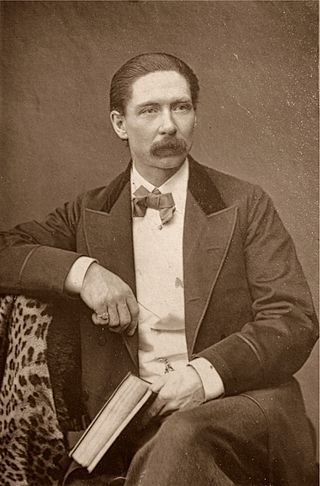
John Nevil Maskelyne was an English stage magician and inventor of the pay toilet, along with other Victorian-era devices. He worked with magicians George Alfred Cooke and David Devant, and many of his illusions are still performed today. His book Sharps and Flats: A Complete Revelation of the Secrets of Cheating at Games of Chance and Skill is considered a classic overview of card sharp practices. In 1914 he founded the Occult Committee, a group to "investigate claims to supernatural power and to expose fraud".
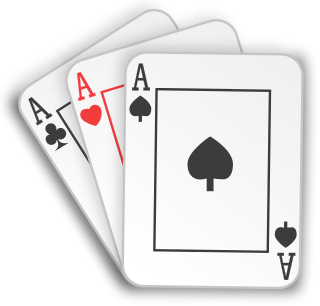
Teen patti is a gambling card game. Teen Patti originated in India and is popular throughout South Asia. It originated in the English game of three-card brag, with influences from poker. It is also called flush or flash in some areas.
The following is a glossary of poker terms used in the card game of poker. It supplements the glossary of card game terms. Besides the terms listed here, there are thousands of common and uncommon poker slang terms. This is not intended to be a formal dictionary; precise usage details and multiple closely related senses are omitted here in favor of concise treatment of the basics.
Draw poker is any poker variant in which each player is dealt a complete hand before the first betting round, and then develops the hand for later rounds by replacing, or "drawing", cards.
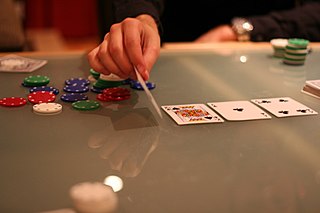
Community card poker refers to any game of poker that uses community cards, which are cards dealt face up in the center of the table and shared by all players. In these games, each player is dealt an incomplete hand face down, which are then combined with the community cards to make a complete hand. The set of community cards is called the "board", and may be dealt in a simple line or arranged in a special pattern. Rules of each game determine how they may be combined with each player's private hand. The most popular community card game today is Texas hold 'em, originating sometime in the 1920s.
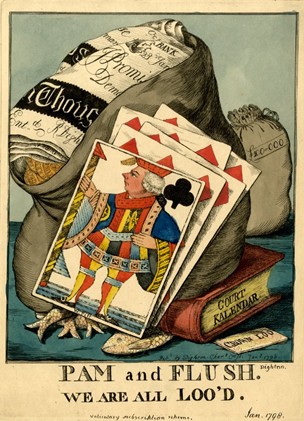
Lanterloo or Loo is a 17th-century trick taking game of the trump family of which many varieties are recorded. It belongs to a line of card games whose members include Nap, Euchre, Rams, Hombre, and Maw. It is considered a modification of the game of "All Fours", another English game possibly of Dutch origin, in which the players replenish their hands after each round by drawing each fresh new cards from the pack.














